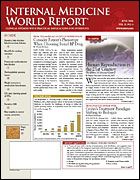Publication
Article
Internal Medicine World Report
New Options for Psoriasis Treatment
Author(s):
SAN FRANCISCO—Several new and investigational treatment options for psoriasis were highlighted during a psoriasis symposium at the American Academy of Dermatology’s 64th Annual Meeting; these showed promising results that may soon offer patients better control of plaque psoriasis.
The efficacy of the biologic adalimumab (Humira) for the control of moderate-to-severe chronic plaque psoriasis was demonstrated in 100% of patients for up to 60 weeks in a recent phase 3 clinical trial. Adalimumab is currently approved for psoriatic arthritis.
“These results are impressive, and the number of patients achieving a Psoriasis Area Severity Index [PASI] response of 90% [PASI 90] clearing of disease was extremely high,” said Kenneth Gordon, MD, director, Psoriasis Clinical and Research Program, Loyola University Medical Center, Chicago.
In one study 147 patients with psoriasis received an 80-mg dose of adalimumab and were then randomized to receive 40 mg every other week; 80 mg at 1 week, and 40 mg weekly thereafter; or weekly placebo. At week 12, patients in the active treatment groups continued their current dosages, and patients in the placebo group received 40 mg every other week, for an additional 48 weeks.
At baseline, 56% of patients reported a very large or extremely large disease impact; the remainder reported a moderate impact. At 12 weeks, 85% of patients dosed every other week and 86% of those dosed weekly said that psoriatic lesions had no or only a very small impact compared with 4% of patients receiving placebo.
The effect was maintained and even improved over time, with little or no disease impact reported by the majority of patients in both treatment groups.
Results of a related study with 138 patients with psoriatic arthritis who also had moderate-to-severe plaque psoriasis showed similarly beneficial effects with the use of adalimumab.
Phase 2 trial results of a new monoclonal antibody, CNTO 1275 (Centocor), showed that 1 dose can maintain psoriasis clearing for up to 24 weeks. “This is the most exciting agent in early development,” said Dr Gordon. “With just 1 dose, 52% had a PASI 75. These are great numbers. Responding patients appear to maintain response, but more safety data are needed.”
CNTO 1275 is an injectable agent that targets both interleukin 12 and 23—two of the key cytokines involved in type 1 immune responses, according to investigator Gerald G. Krueger, MD, of the University of Utah Health Sciences Center, Salt Lake City.
A total of 320 patients were randomized to receive a 50- or 100-mg injection of CNTO 1275 or placebo. Patients not showing at least a 75% improvement received an additional 50- or 100-mg dose at week 16. All placebo patients received a 100-mg dose at week 20.
P
After 12 weeks, a 75% disease-clearing response was seen in 52% of those in the single 50-mg-dose group, 59% of those in the single 100-mg-dose group, 67% of those in the 4 weekly 50-mg-dose group, and 81% of those in the 4 weekly 100-mg-dose group. Only 2% of placebo patients achieved a 75% or 90% clearing of disease ( <.001). Fewer than half of the patients required redosing, and the majority maintained their response through week 24.
A third study showed that a low dose (25 mg/d) of the already approved oral retinoid acitretin (Soriatane) is effective for moderate-to-severe psoriasis and can minimize adverse effects, such as hyperlipidemia and elevated liver enzymes. Current practice is a maximally tolerated dose of up to 50 mg.






